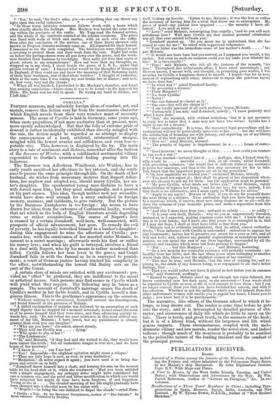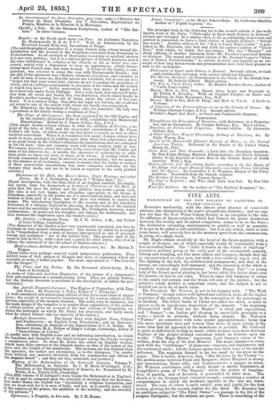PUBLICATIONS RECEIVED.
Boons.
.Tournal of a Cruise among the Islands of the Western Pacifio, includ- ing the l'esjees and others inhabited by the Polynesian Negro Races, in her Majesty's ship Havannah. By John Elphinstone Erskine, Capt. R.N. With Maps and Plates.
A Visit to Mexico, by the West India Islands, Yucatan, and United States ; with Observations and Adventures by the Way. By Wm. Parish Robertson, Author of "Letters on Paraguay," &c. In two volumes.
Recollections of a Three Years' Residence in China; including Pere- grinations in Spain, Morocco, Egypt, India, Australia and New Zealand. By W. Tyrone Power, D.A.C.G., Author of "New Zealand Sketches."
Le Gouvernement du Deux .Dicembre, pour faire suite a l'Ilistoire des Crimes du Deux Decembre. Par V. Schcolcher, Representant du Peuple, Membre de in Reunion de la Montagne.
Cyrilla ; a Tale. By the Baroness Tautphoeus, Author of "The Ini- tials." In three volumes.
_Rosalie; or the Truth shall make you Free. An Authentic Narrative. By Mademoiselle R. B. de P *5*. 'With an Introduction by the Reverend Joseph Ridgeway, Incumbent of Penge.
[The autobiographical narrative of a young French lady, whom inward dis- satisfaction and the perusal of the Scriptures converted from Romanism to Protestantism. As an example of theological reasoning or spiritual unction it is not very striking; but it is a curious picture of French manners, and of the utter indifference to religion or the church, so far as belief was con- cerned, united with a disposition to keep up appearances, which charac- terizes most French men and some women. A friend of the family, a com- mandant, was selected to argue the case with Mademoiselle Rosalie ; and the gist of his argument was—Believe whatever you please, and consider, as I and all men of sense do, that the priests are tricksters, but do not say so— "forget not that your social duty consists in not wounding the prejudices of others, and in yielding complacently to the rules of the times and the society in which you move." Active persecution there was none ; it might not have been safe under Louis Philippe. But a cold, hard, iron species of isola- tion from all social and family ties, was instituted, which ended finally in Rosalie's mother turning her out of doors, under the advice of her con- fessor. It is a curious thing, that after her lapse was known, she could not get access to any of the priests with whom the family was acquainted. Mr. Ridgeway, the incumbent of Penge, edits the narrative : the lady was a governess in his family during a residence at Pan.] The Plays of Shakespeare : the Text regulated by the Old Copies, and by the recently-discovered Folio of 1632, containing early Manuscript Emendations. Edited by J. Payne Collier, Esq., F.S.A.
[This ample double-column volume is, with the addition of Pericles, a re- print of the folio of 1632, and the manuscript emendations of Mr. Payne Collier's old book, of which every one has heard so much, as well as other received corrections. When it is considered how many changes editors have made in texts, grounded on nothing more than their own conjectures, there is no great harm in Mr. Collier's adopting the emendations that are contained in his old book : time and common sense will bring matters right at last. We cannot, however, attach the value to the corrections that Mr. Collier and some of his followers do; • or ascribe the character of authenticity to addi- tions made we know not how' or when, or by whom. A reading which ob- viously commends itself maybe received as an emendation ; but we cannot, in the absence of all testimony, consent to assume that the writer or writers of these manuscript emendations had some unknown authority for the changes they made, and are to be taken as superior to the early printed editions.] Christmas at the Hall, the Hero's Grave, _Night Musings, and other Poems. By T. J. Torrington, Author of "Welton Dale,' &c.-
[Rural descriptions, with the beau ideal of an English landlord, his family, and career, form the framework as it were of Christmas at the Hall, in order that the hero Sir Arthur and his children may recite a poem each. The idea is not very happy, nor altogether appropriate to the theme of Christmas, especially as the poems are of a miscellaneous kind, and were not written to form part of a piece, but the piece was written to receive the poems. The introductory description of the country and of the beneficial influences of a virtuous landlord is pleasing, from the truth of the natural scenes and the amiability of the sentiments. Mr. Terrington, however, wants condensation ; he pours out his thoughts and images too exuberantly, and thus weakens the impression upon the reader's mind.] The Idealist : a Dramatic Poem. By j. H. Rohrs, A.M., late Fellow of Jesus College, Cambridge. [The character of the idealist is not very consistently conceived, nor does he originate in very natural circumstances. The means by which he is sought to be 'transformed from a state of dreamy introspection to one of practical energy and usefulness "are of the wildest kind. The greater part of the i scene s laid in Sicily, with a nun and a jesuit for chief actors, who rival in villany the extremest of the old school of Italian romance.] Half-a-Dozen Ballads for Australian Emigrants, &c. By Martin F. Tupper. [These bides were perhaps scarcely worth independent publication. They exhibit none of that aptness of thought and force of expression which are requisite to make a ballad popular. The most appropriate is "The Convict and the Pauper."] The Vicar and his _Duties. By the Reverend Alfred Getty, M.A., Vicar of Ecclesfield.
[A series of tales and sketches illustrative of the nature of a clergyman's duty and experiences in a manufacturing town. They are plainly written, but the literary character is sacrificed to the theological, or rather the pro- fessional.]
Sex. Aurelii Propertli Carmine. The Elegies of Propertius, with Eng- lish Notes. By Frederick A. Paley, Editor of " /Eschylus." [A well-considered and painstaking edition of this little-read chief of elegiac poets; the result of an extensive examination of the various editors of Pro- pertius, especially of the modern German. The notes vary in character, but the main design of the compiler is to render them explanatory of the author. A critical preface gives an account of the best editions of Propertius, ex- plains the principles on which Mr. Drake has proceeded, and fairly meets what he cannot defend—the lax morality of his author.]
.Eschyli Eumenides. The Greek Text, with English Notes, Critical and Explanatory ; an English Verse Translation ; and an Introduc- tion, containing an Analysis of the Dissertations of C. 0. Mailer. By Bernard Drake, MA., Fellow of King's College, Cambridge, Editor of "Demosthenes de Corona."
[A goodly text, with English notes and an informing introduction, in which the functions and character of the blood-avenger among the Greeks occupies a conspicuous place. To these Mr. Drake has added an English version, which more than conveys to the English reader an idea of the action of the piece and the weight of the sentiments. The choruses are less fettered than the speeches, the author not attempting, as in the dialogues, "to render them without any material deviation from the construction and idioms of the original Greek" ; and they are free, animated, and poetical.]
History of the Reformation of the Sixteenth Century. Volume V. The -Reformation in England. By Y. H. Merle D'Aubigne D.D., President of the Theological Society of Geneva, &c. Translated by H. White, B.A. Trinity Coll., Cambridge. [This fifth volume of D'Aubigne's work begins the Reformation in England. It will in part be composed upon the principle of showing that the Reforma- tion under Henry the Eighth was "essentially a religious transaction, and that we must seek for it in men of faith, and not, as is usually done, solely in the caprices of the prince, the ambition of the nobility, and the servility or the prelates."]
Pyracmon ; a Tragedy, in five acts. By J. H. Keane. Frank Vansittart ; or the Model School-Boys. By Catherine Sinclair, Author of" Popish Legends," &c.
The principal book in the following list is the seventh edition of the well- known work of Dr. Paris, "Philosophy in Sport made Science in Earnest," revised and enlarged. In a similar class, so far as combining instruction and interest is concerned, we have a third edition of Isabella Gifford's "British Sea-weeds." Another edition of the "Key to Uncle Tom's Cabin" is pub- lished by Mr. Bosworth, who first sent forth the author's edition of "Uncle Toni," with which, we think, this key ranges. The two " Moneys " are cheap editions of another American book—Mr. Freedley's practical treatise on business. The second and revised edition of Mr. Durrant Cooper's "Glos- sary of Sussex Provincialisms" is curious' in itself, and singular as an ex- ample of how long Saxon words and pronunciation have held their ground eo near to the metropolis.
Philosophy in Sport made Science in Earnest. Seventh edition, revised and considerably enlarged, with several additional Chapters. The Marine Botanist ; an Introduction to the Study of the British Sea- weeds. By Isabella Gifford. Third edition.
The Key to Uncle TOM' 8 Cabin. By Harriet Beecher Stowe, Author of "Uncle Tom's Cabin."
Money: How to Get, Save, Spend, Give, Lend, and Bequeath it. By Edwin T. Freedley. With an Original Chapter on Banks and Banking, by John Macgregor, Esq., M.P. Money : How to Get, How to Keep, and How to Use it. A Guide to Fortune.
A Glossary of the Provincialisms in use in the County of Sussex. By William Durrant Cooper, F.S.A. Second edition. Webster's _Royal Red Book; or Court and Fashionable Register.
Pssreunrrs.
Thoughts on the Principles of Taxation, with Reference to a Property-
tax, and its Exceptions. By Charles Babbage, Esq. Third edition. Taxation, its Nature and Properties. Second edition. By Alexander Gibbon, Esq. A Short and Sure Way of Preventing Bribery at Elections, &c. By Rigby Wason, Esq. Speech of the Honour ableEdward Everett, of Mass., on the Central American Treaty. Delivered in the Senate of the United States, March 21, 1853. Costa Rica and New Granada; a Look into the Boundary Question. By Don Felipe Molina, Minister Plenipotentiary and Envoy Extraor- dinary of the Republic of Costa Rica to the United States of North America. With a Map. Defence for the full Hereditary Right, according to the Lex Regia, of the _Kings and Royal House of Denmark, especially Prince Christian and his Spouse. By Councillor C. F. Wegener, beeper of the Privy Archives. Translated from the Danish originaL
The Bridges of _London. By Francis Bennoch. The Pope in England ; and Who shall Turn him Out. By Pen Cler Jocelyn.
Tract for Soldiers. By the Author of "The Faithful Promiser," &c.



























 Previous page
Previous page